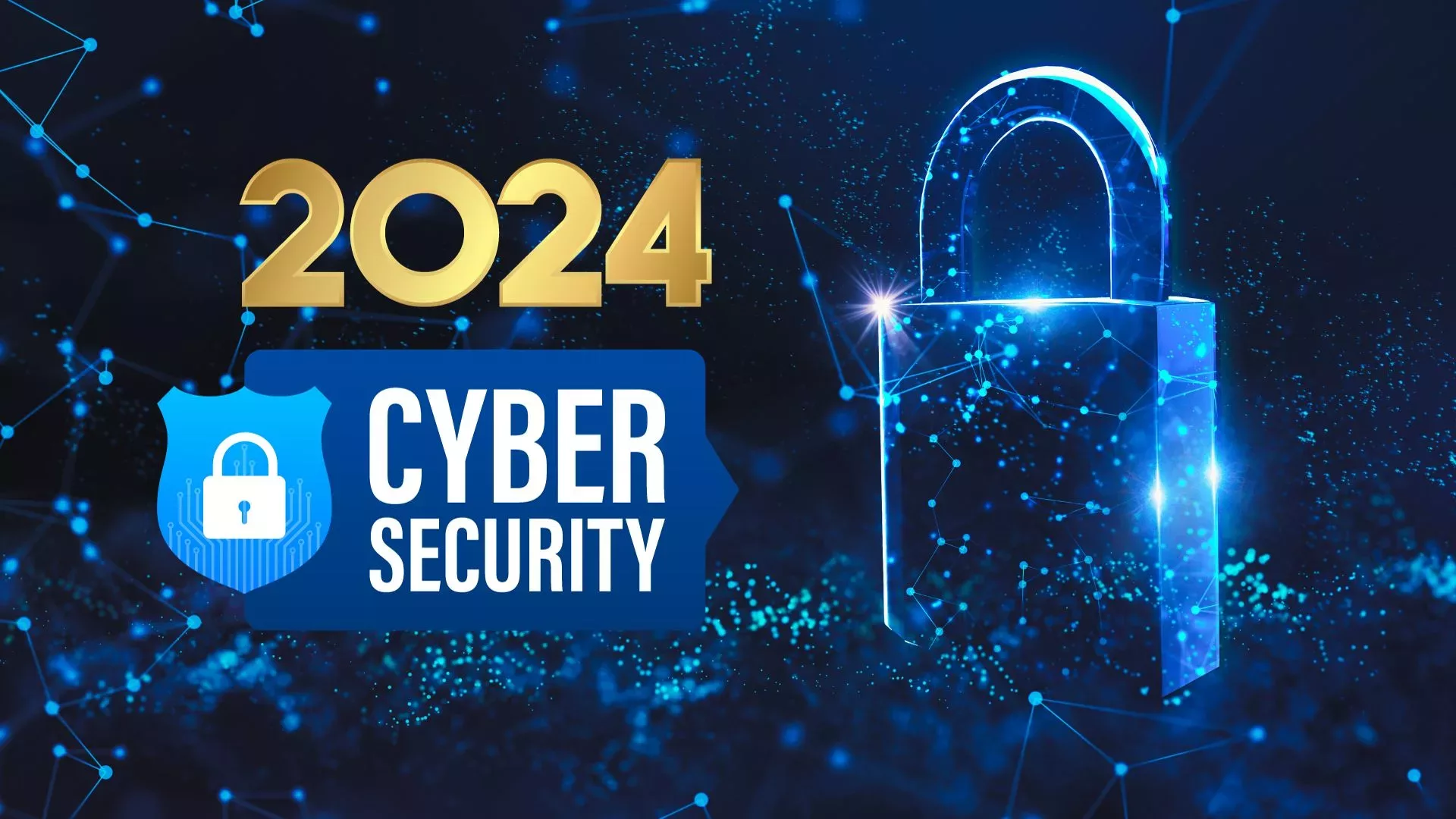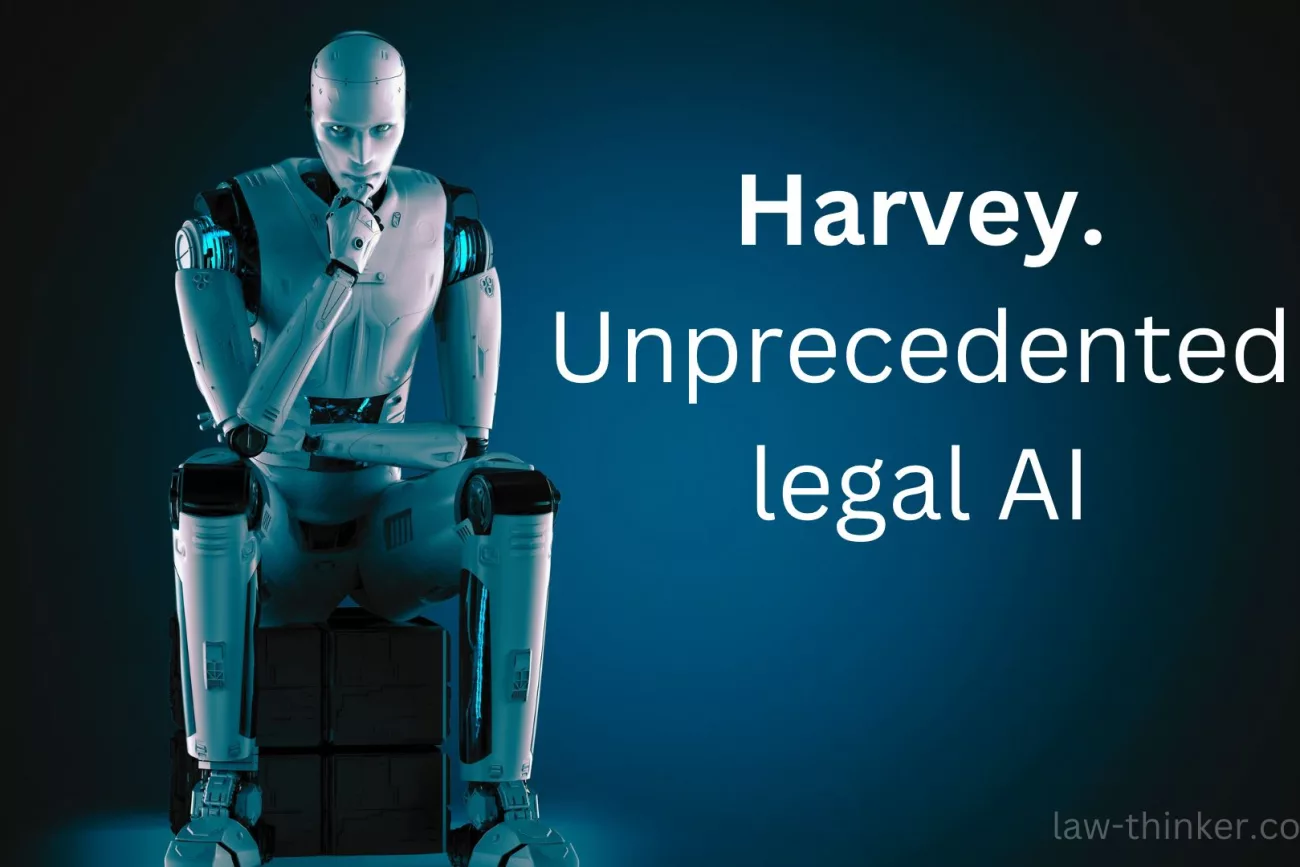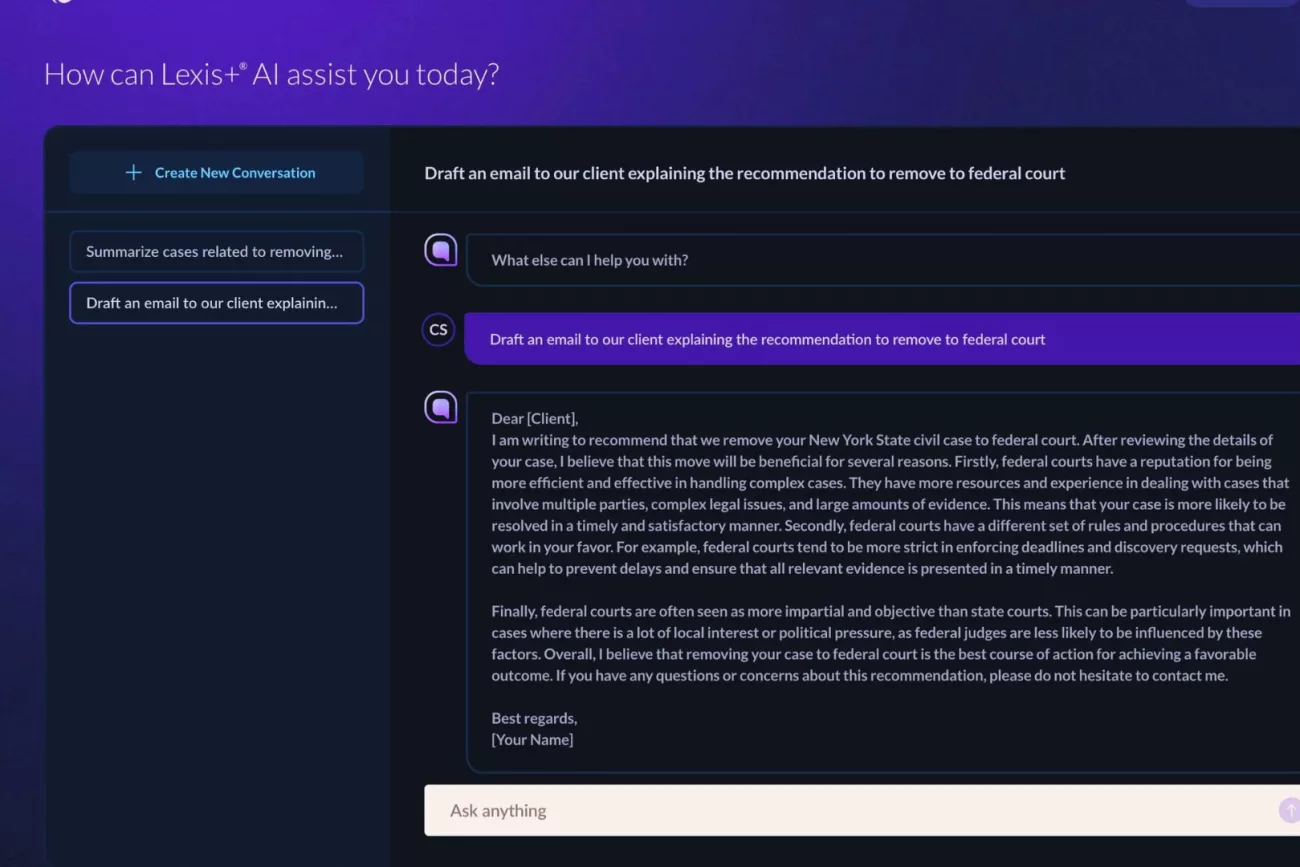
Key Points
- AI’s Growing Influence: AI is significantly impacting cybersecurity in 2024, offering advanced solutions for threat detection and data protection.
- Emerging Cyber Threats: The rise of AI brings new challenges, including sophisticated phishing attacks and the unregulated use of AI tools.
- Best Practices for Legal Firms: Law firms need to embrace AI-driven cybersecurity strategies, focus on staff training, and establish ethical AI usage policies.
- Staying Ahead of Cyber Threats: Continuous learning and strategic partnerships with AI security firms are essential for legal professionals to tackle AI-driven cyber threats.
Legal Bots: Are They Diminishing the Value of Legal Expertise? 🤖⚖️
Key Points: Legal bots are increasingly prevalent in the legal profession, automating tasks and increasing
Human vs AI Analysis in USPTO: Uncovering the True Potential of Bard
Key points: AI systems like Bard revolutionize patent examination by increasing efficiency, accuracy, and reducing
Lawyer for Wrongful Death: Your Comprehensive Guide
Mike Ruggles Founder & CEO Instagram Linkedin Follow me on Instagram & LinkedIn for exclusive
AI in Cybersecurity: A Double-Edged Sword for 2024? 🤖⚖️
AI’s Cybersecurity Tsunami: Ready to Ride the Wave or Wipe Out?
In this high-octane era of technological marvels, we’re not just flirting with the future; we’re dating it! The realm of cybersecurity is about to get a major facelift thanks to AI. Leading tech prophets like Tim Jackson, Andrew Winlaw, and others are heralding a new dawn where AI looms large over cybersecurity and business operations. Fasten your seatbelts; it’s going to be a bumpy, thrilling ride!
1. Cybersecurity Overhaul: AI Redefines Digital Defenses! 🛡️👾
Tim Jackson’s Clarion Call: Tim Jackson of Access4 isn’t just raising an alarm; he’s initiating a digital revolution in cybersecurity. The landscape is no longer about firewalls and antivirus software; it’s about integrating the Essential Eight—strategies ranging from multi-factor authentication to regular patch updates, forming a robust shield against cyber threats.
However, AI is dramatically shifting the goalposts, evolving from a supportive tool to the main architect of cybersecurity strategies. This transition from traditional methods to AI-centric solutions presents a new challenge—the quest for tech talent capable of harnessing AI’s full potential. It’s a modern-day quest for digital knights who can navigate both collaborative and individual battles in the cybersecurity realm.
2. AI’s Massive Leap: Transforming Tech Security Landscape! 🌐💡
Andrew Winlaw’s Vision of AI Expansion: Andrew Winlaw of Amelia points to a seismic shift where AI is no longer a niche technology but a vast playground for innovation. Open-source libraries and cloud platforms are democratizing AI, making it accessible to a broader range of users.
This expansion brings AI to the forefront in combating cyber threats, with capabilities like real-time threat detection and automated response systems. However, this rapid expansion of AI applications in cybersecurity is not without its challenges.
As AI becomes more ingrained in cybersecurity, the need for stringent data privacy regulations and heightened public awareness becomes crucial. The stakes are high, and the rules of the game are changing, with AI both as a powerful ally and a potential vulnerability.
3. Generative AI: A Tech Tipping Point for Humanity? ⚖️🚀
Ameya Talwalkar’s Dual-Use Dilemma: Ameya Talwalkar of Cequence Security underscores the double-edged nature of generative AI. This technology holds the promise of propelling humanity to unprecedented heights of innovation, but it also harbors the risk of misuse that could set back progress.
The key to harnessing generative AI’s power lies in secure and ethical API integration, serving as the gatekeepers of AI’s application. The year 2024 is projected as a watershed moment, where secure data sharing and ethical AI use will not just be best practices but necessities for a resilient, AI-empowered future. The responsibility lies in wielding AI not just as a tool but as a trusted ally, ensuring its power is harnessed for constructive, not destructive, purposes.
4. The End of Traditional SIEM: AI Ushers New Cyber Era! 🔄🧠
Bernd Greifeneder’s Cybersecurity Revolution: Bernd Greifeneder from Dynatrace foresees a radical shift in the cybersecurity landscape in 2024. Traditional Security Information and Event Management (SIEM) systems, once the backbone of cybersecurity strategies, are on the verge of becoming obsolete.
The new era will be dominated by next-generation threat intelligence solutions, a symphony of AI-driven techniques such as generative, causal, and predictive analytics. These advanced solutions offer a holistic view of cybersecurity threats, providing deeper, more accurate, and automated analyses.
Furthermore, the emergence of the Chief AI Officer (CAIO) role signifies the growing importance of AI’s governance, security, and compliance, indicating a future where AI is deeply integrated into the strategic framework of organizations’ cybersecurity defenses.
5. AI in Cyber Warfare: The Dawn of Digital Gladiators! 🤺💻
Phil Swain’s Sci-Fi Reality: Phil Swain from Extreme Networks paints a picture of the future that seems ripped straight from a sci-fi novel. The emerging battlefield isn’t physical; it’s digital, with AI at the helm.
Swain highlights how AI is no longer a theoretical concept but a tangible tool that is being weaponized for sophisticated cyber attacks. Phishing and zero-day attacks are now being crafted with AI’s precision, making them more elusive and dangerous.
The future Swain envisions is one where AI-powered security bots, akin to digital gladiators, engage in real-time combat in a virtual coliseum, defending organizations from these advanced threats. This new form of digital warfare requires a shift in cybersecurity strategy, where AI is not just a defense mechanism but an active combatant in the fight against cybercrime.
6. AI’s Tightrope Walk: Innovating While Securing Data! 🌍🔒
Chris Ellis’s AI Paradigm Shift: Chris Ellis from Nintex forecasts a significant change in 2024 with AI becoming mainstream. Tools that were once available to only a select few are now accessible to a broader audience, thanks to platforms like Microsoft Office and ServiceNow.
However, this democratization of AI brings a new set of challenges, especially in maintaining the delicate balance between innovation and security. As AI becomes more integrated into business operations, it raises concerns about data integrity and business security. Ellis emphasizes the need for businesses to carefully navigate this new landscape, ensuring that the adoption of AI does not compromise their cybersecurity posture.
7. Shadow AI Threat: The Hidden Danger in Offices! 🕵️♂️🚨
Uri Dvir’s Warning on Covert AI Operations: Uri Dvir from WalkMe highlights a critical but often overlooked aspect of AI in the corporate sector—Shadow AI. This phenomenon refers to the use of AI tools by employees without proper oversight or compliance checks, posing significant risks to data privacy and security.
The unchecked proliferation of AI tools can lead to inadvertent data breaches or even intellectual property theft. Dvir suggests that the solution isn’t outright prohibition, which could stifle innovation, but rather the development of comprehensive policies and guidelines that allow for safe and productive use of AI tools within the corporate environment.
8. Vishing Epidemic: AI Deepfakes Spark New Cyber Threat! 📞🎭
Corey Nachreiner’s Deepfake Alarm: Corey Nachreiner from WatchGuard Technologies brings attention to a rapidly growing threat in the digital landscape: voice phishing or ‘vishing.’ He cites a staggering 550% increase in such attacks, underscoring the evolving nature of cyber threats.
The future threat, as Nachreiner sees it, lies in the combination of deepfake audio technology and large language models (LLMs), which could make traditional human-operated scam calls obsolete. This new breed of AI-driven vishing attacks can be more convincing, difficult to detect, and potentially more widespread, signaling an urgent need for advanced detection and prevention strategies.
Best Practices for Law Firms and Legal Departments: Fortifying Against Cybersecurity Threats in 2024
AI’s Pivotal Role in Cybersecurity: Preparing Legal Eagles for the Digital Storm 🌪️🔒
As AI reshapes the cybersecurity landscape, law firms and legal departments must gear up for the challenges and opportunities this transformation brings. 2024 isn’t just a year; it’s a new era in digital defense. Here’s how legal professionals can navigate these waters:
1. AI-Driven Cybersecurity Strategies: A New Frontier in Legal Defense
- Invest in Advanced AI Tools: Implement AI-driven cybersecurity solutions that offer real-time threat detection and response.
- AI for Predictive Threat Analysis: Use AI to analyze patterns and predict potential cybersecurity threats, staying one step ahead of cybercriminals.
2. Education and Awareness: The First Line of Cyber Defense
- Cybersecurity Training: Regular training sessions on the latest cybersecurity threats and AI tools should be mandatory for all staff.
- Stay Informed: Keep abreast of the latest cybersecurity trends, threats, and AI advancements to make informed decisions.
3. Embracing Ethical AI Use in Cybersecurity
- Develop Ethical AI Policies: Create guidelines for the responsible use of AI in cybersecurity, ensuring compliance with legal and ethical standards.
- Regular Audits and Compliance Checks: Continuously monitor AI tools for compliance with data protection laws and ethical guidelines.
4. AI-Powered Data Protection: Safeguarding Sensitive Information
- Enhanced Data Encryption: Utilize AI algorithms for advanced data encryption, protecting sensitive client information.
- AI in Data Privacy: Employ AI tools to identify and rectify any data privacy vulnerabilities.
5. Talent Acquisition and Skills Development
- Recruit AI-Savvy Cybersecurity Experts: Hire professionals with expertise in both AI and cybersecurity.
- Ongoing Skill Development: Encourage continuous learning and upskilling in AI-based cybersecurity tools and techniques.
6. Preparing for AI-Enabled Cyber Threats
- Anticipate AI-Enhanced Phishing and Scams: Be vigilant about sophisticated AI-driven threats like deepfake audio and advanced phishing tactics.
- AI Countermeasures: Implement AI tools capable of identifying and neutralizing AI-generated cyber threats.
7. Policy Development and Regulatory Compliance
- Stay Ahead of Regulatory Changes: Monitor and adapt to changing cybersecurity laws and regulations influenced by AI advancements.
- Develop Comprehensive Cyber Policies: Update cybersecurity policies to include AI-specific considerations and protocols.
8. Building an AI-Resilient Infrastructure
- Robust IT Infrastructure: Ensure that the IT infrastructure is equipped to handle advanced AI cybersecurity tools.
- Regular System Upgrades and Maintenance: Keep all systems updated to protect against vulnerabilities and ensure compatibility with AI tools.
9. Partnering with AI Cybersecurity Experts
- Collaborate with AI Security Firms: Work with specialized AI cybersecurity firms for tailored solutions and expert insights.
- Participate in AI Security Forums: Engage in industry forums and discussions on AI cybersecurity to stay connected with the latest trends and solutions.
🚀 Your Turn: AI in Cybersecurity – Savior or Saboteur?
This isn’t just a set of predictions; it’s a catalyst for robust debate and discussion. As we stand on the brink of a major AI revolution in cybersecurity, the question remains: Will AI be our savior, safeguarding our digital realms, or will it become the ultimate saboteur, opening new avenues for cyber threats? The time to decide is now. Join the conversation and shape the future of cybersecurity in the AI era.
Share this post
Frequently Asked Questions (FAQs)
Q: How is AI transforming cybersecurity in 2024?
A: AI is revolutionizing cybersecurity with advanced threat detection, predictive analytics, and enhanced data protection, posing both opportunities and challenges.
Q: What are the major cybersecurity threats in the AI era?
A: Key threats include sophisticated AI-driven phishing attacks, deepfake scams, and unregulated use of AI tools leading to data breaches.
Q: What should law firms do to adapt to AI in cybersecurity?
A: Law firms should invest in AI-powered security tools, train staff in AI and cybersecurity, and develop ethical AI policies and robust data privacy practices.
Q: How can legal professionals stay ahead of AI-driven cyber threats?
A: Staying informed about the latest AI advancements, regularly updating cybersecurity strategies, and partnering with AI security experts are crucial steps.
Q: What role do ethics play in AI and cybersecurity?
A: Ethical considerations are paramount, including developing policies for responsible AI use and ensuring compliance with data protection laws and regulations.















